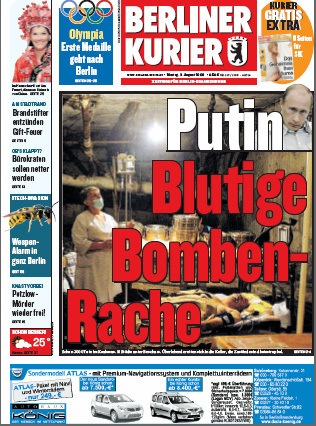Winner
Diverse in Unity
Russia always has been the bad guy (and by Russia I mean their government). The only difference is that now they have plenty of money from oil and gas. Another Cold War has already begun, and it will only get worse, unless we come up with something that makes oil/gas unprofitable.
Cold war in what sense? Certainly not a global undeclared conflict between two superpowers. Russia is a problem, much larger one than, say, Iran, but its power has greatly diminished since 1989. Despite all that oil/gas scare in Western Europe, it can't even effectively use this weapon against the West, not for long, since Russian economy is dependant on steady inflow of Western money.
Regardless of what you may believe the purpose was, I have never before seen someone decrying the industrialization of a mostly agricultural country, as far as the economy is concerned. Germany was agricultural and became industrialized, do you think that made them poorer? And the land is still there, no?
Depends on how it's done. When it happens in an enviroment of free enterprise and market economy, the industrialization in general improves the living standard of the population. On the other hand, when the industrialization is planned to focus on one branch of industry (heavy machinery, steel production etc., simply put the stuff you need to build tanks) while the other, much more needed for everyday life of the citizens, are ignored, the result is an unviable and costly nonsense, a waste of effort. Something like the pyramids, only worse, because the pyramids at least attract tourists, while the abandoned megafactories in Central and Eastern Europe don't.
I don't think you can make a case that those eastern european countries (or central, or whatever) were exploited. East Germany was, but that was a consequence of WW2. The others? By 1989 their territory was wealthier than most of the USSR's, while most had been both poor before WW2 and ravaged by the time it ended.
The fact that DDR and Czechoslovakia were statistically much better off than the USSR does not prove that these countries were not exploited. In fact, it suggests that they were. Their relative economic well-being (I stress the word 'relative') was largely the result of their better managerial skills, comparably less oppressive forms of communism and a significant pre-war development, plus many other factors I won't mention.
Focus more on what I said earlier. The economy of the satellite states was deliberately focused on certain branch of industry (decided by the Comecon, thus the USSR). For example DDR and Czechoslovakia produced consumer goods for most of the Eastern Bloc because that's what they were (relatively) good at. Despite that, many 5 year plans mostly focused on heavy industry and coal production, ignoring the needs for more and better consumer goods. The goal was clearly to sustain the high levels of Soviet military production.
It's I think comparable in a sense with the Western colonial policy in Africa - the only industries which were developed were related to extraction of natural resources in which the Westerners were interested.
I do not consider Georgia, or even Ukraine any longer, to be viable independent nations. They will become part of "Russia" (some enlarged russian federation) again, both history and geography push them that way.
Well, for most of their modern history, these lands have been trying to get out of Russia. Eastern Ukraine and Crimea are certainly debatable, but the Central and Western Ukraine would be violently opposed to the idea. Also, I see your willingness to sacrifice 50 million people as a bit disturbing. The EU certainly seems to be interested in Ukraine, much more so than in the case of Georgia.
As for Georgia, it's relatively good economic development so far suggests otherwise. We'll see if that continues after the war. The West certainly don't seem to have any other honorable option than to support it.
There was perhaps a chance of building a single eurasian union of independent states, after the implosion of the USSR. Or at least of setting the border between a western european and an eurasian (russian) space further east, and do so in a friendly way. Now it seems to have been wasted, because of some leaders who postured too much and ignored the realities on the terrain.
Perhaps if the Russian government had adopted a sensible post-colonial policy, it would have looked differently. Unfortunately Russia had enough of its own problems back then, and since these problems led to a formation of full-fledged authoritarian regime, I don't see any room for improvement in the future. The Moscow regime is certainly not interested in fair cooperation on equal-to-equal basis with its former "colonies".
Also, the competition from the EU, which has so much more to offer, is simply too hard to overcome without the use of other means - like military force.





 Other morons incapable of sensible discussion who throw around accusations without substance will follow as they show up
Other morons incapable of sensible discussion who throw around accusations without substance will follow as they show up 